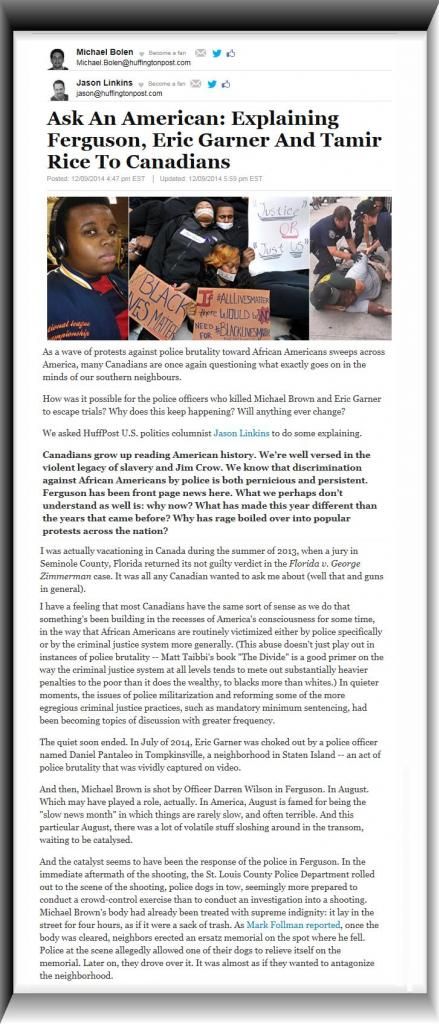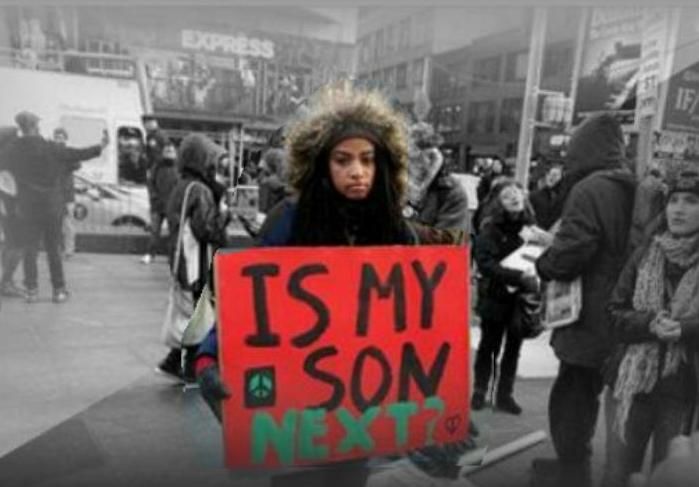Tamir Rice, Michael Brown & Eric Garner Protests, Canadians Ask, NOTHING NEW, WHY NOW?
Who better to ask about the injustices in our Nation than someone who lives outside of it? This article “Ask An American: Explaining Ferguson, Eric Garner And Tamir Rice To Canadians” has come along at a time when much of the America psyche has either slightly questioned or is in total agreement that cops should not be held responsible for their crimes (even if it’s subliminal at the moment). Inspirited protests that will soon be seen as superfluous in a matter of days and eventually wind up as a blip on most people’s minds with the names Timor Rice, Eric Warner and Michael Brown eventually getting lumped together to become one ubiquitous question; Who?
I get overly excited about protests against injustice; (Remember the 99 percent-ers) always ‘sort of’ believing that maybe this time they will work and things will change. Yeah right, then after just a short time, watching them fade away, returning America to business as usual with personalities that should be laughed at, getting elected to the highest governmental posts. But, in spite of my pessimistic nature, I still hold a pinch of faith that perhaps this time it will be different and injustice will become a fluke rather than a status quo. Hmmm, I wonder how long this interlude of my strict belief in Murphy’s Law, will last.

(Murphy's Law is an adage or epigram that is typically stated as: Anything that can go wrong, will go wrong.)

EXCERPT: The officers who killed Eric Garner and Michael Brown won’t be charged because of grand jury rulings. Canada got rid of its last grand juries 30 years ago. They seem open to serious manipulation by prosecutors. Why are they still around and is there any way to get rid of them?
Grand juries play roles both symbolic and practical in the criminal justice system. All of which are arguably vestigial. From a practical standpoint the grand jury proceedings allow a prosecutor to lock down sworn testimony from witnesses (to guard against their stories changing), and make a test run of the case in front of a jury pool. Symbolically, the grand jury is supposed to be a guard against prosecutorial misconduct -- ordinary citizens essentially vet the case and, in theory, this is supposed to guard against a rogue prosecution. Additionally, America's governing bureaucracies at all levels tend to allow "activity" to pass for "achievement." Grand juries are supposed to serve as proof that the justice department is working. After all, prosecutors are out there, getting indictments!
If you've read Thomas Wolfe's book "The Bonfire Of The Vanities," then you have probably encountered the saying, "A good prosecutor could indict a ham sandwich." The phrase is attributed to a judge named Sol Wachtler, who learned this the hard way when he was himself indicted for extortion.
The Huffington Post's Sam Stein recently hosted an edition of his "Drinking And Talking" roundtable series about the Michael Brown/Eric Garner cases, in which two of his guests -- civil rights attorney Donald Temple and civil attorney Doug Sparks -- discuss the results of the grand juries in both cases. I recommend readers check it out, but their salient point is that a grand jury will do whatever a prosecutor leads them to do. It would appear in the Ferguson case that the prosecutor, Bob McCulloch, simply did not want to indict a cop. So the evidence was presented in a way that favored Wilson's point of view. Typically, a prosecutor just uses the grand jury to determine whether there is probable cause -- a reason to have a trial. I don't think the evidence in Michael Brown's case necessarily made for a slam-dunk prosecution of Wilson. Still, I would have preferred to have a trial sort all of that out.
McCulloch's behavior was pretty unusual for a prosecutor. In the tedious, twenty-minute oration that he gave when releasing the grand jury's decision, McCulloch made it clear that to his mind, it was simply ridiculous that anyone even asked for an investigation into the killing of Michael Brown. To McCulloch, Brown's death was simply the natural order of the universe, and questioning that was inconceivable. He made that point, over and over again, along the way blaming the national press and "social media" for essentially perverting what he saw as the natural order of things. The grand jury, McCulloch said, "gave up their lives" to render a decision in this case -- clearly he thought the entire matter wasn't worth even a moment of skepticism, and those who humored the skeptics made great sacrifices.
But prosecutors of all stripes have a fairly cozy relationship with the police. This is somewhat understandable -- the police help prosecutors make cases, after all. But what happens when the suspect is a cop? A grave imbalance, as it turns out: as Trevor Timm, making the case for reforming the grand jury system in The Guardian, notes: "If you are an ordinary citizen being investigated for a crime by an American grand jury, there is a 99.993% chance you’ll be indicted. Yet if you’re a police officer, that chance falls to effectively nil."
Will we get reform? I think it will be discussed in some circles, and reforms will be proposed, and then those reforms will quietly die on the vine.~~~For the last generation the Republican Party has branded itself as the "law and order party," but the recent libertarian strain in the conservative caucus is forcing a re-think of supporting police and prosecutors unquestioningly. There is a possibility that Senators like Ted Cruz (R-Texas) and Rand Paul (R-Ky.), and Representatives like Raul Labrador (R-Idaho) can help create bipartisan reforms to the criminal justice system that would change the way non-violent drug offenders are sentenced, ending the practice of mandatory minimum sentences. It's not like Eric Garner's death had a lot to do with these things that we are close to reforming -- but sympathy for a man unjustly killed could nevertheless inspire a heroic act of legislation. Or, nothing will happen, because conservative legislators won't want Obama to get "credit" for signing a legacy-boosting sentencing reform bill into law. (There's that zero-sum thinking again!)
But look, you have really come to the wrong person if you want optimism. It wasn't long ago that the shocking video of James Foley's death at the hands of ISIS inspired the nation to once again get its war on. These days, I'm still watching execution videos -- but the killers aren't people who flamboyantly cast themselves as the enemies of our way of life. Rather, they are the police we assign to protect it. And these cops demonstrate a similar level of brutality, and an equal lack of remorse, in and for their actions. What's lacking is the effort to really do something about it. I don't expect that to change.
I recently read a blog post from the mother of a mixed-race family -- her two sons, Owen and Kyle, were adopted from Haiti. () Two days before Thanksgiving, she wrote, "Today, we are dealing with the Ferguson decision. It is another sad, sad day for mamas of black boys. Deeply demoralized and shaking scared, we keep on fiercely loving them, and wait and hope for the world to see them as we do." This is a rare instance of a white mother who is able to empathize -- not merely sympathize, empathize -- with the fear that African-American women who raise sons and daughters (but especially sons!) live with every day. Fostering empathy is brutally impossible work, I recommend her piece as a tool in at least doing the necessary thought-exercises. I fear, however, she has much longer to wait. As do we all.More Here: http://www.huffingtonpost.ca/2014/12/09/
ferguson-eric-garner-tamir-rice-canada_n_6297150.htmlferguson-eric-garner-tamir-rice-canada_n_6297150.html








<< Home